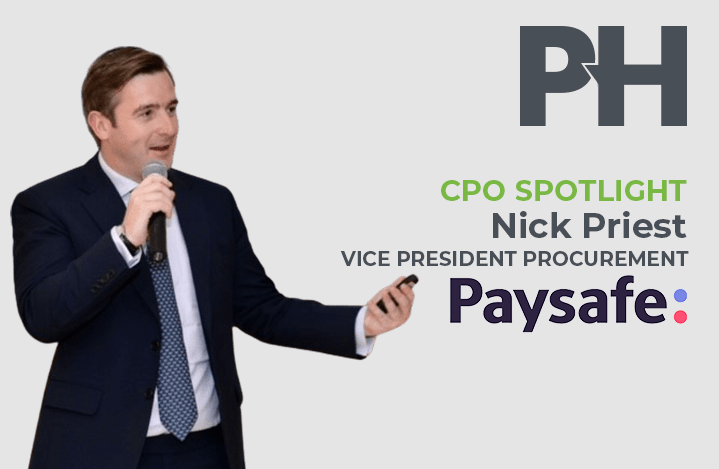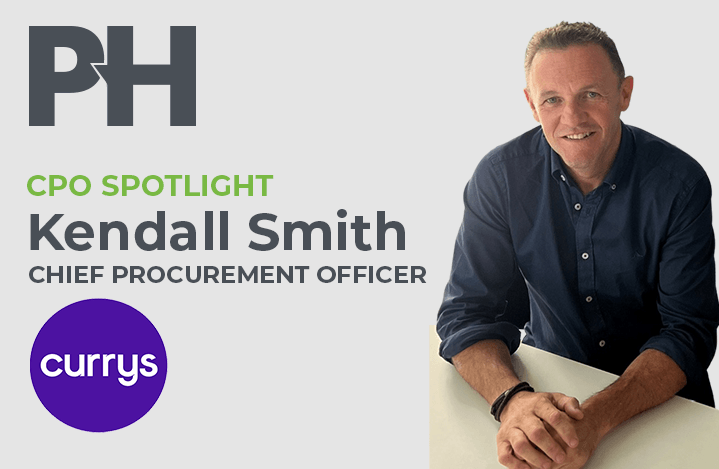For the latest in Procurement Heads‘ CPO Spotlight series, he spoke with James Dobbin about how he got into procurement, some of the trends he’s seeing in the financial and procurement space and whether the pandemic has pushed us closer to a cashless society.
Could you tell us a little about Paysafe and what it is that you do
Paysafe is a leader in the payment sector and has been for the last 20 years.
We have a two-sided consumer and merchant network and specialise in enabling businesses and consumers to connect and transact seamlessly through payment processing, digital wallets, and online cash solutions.
We handle around $120 billion in transactions on an annualised basis, and we have around 3,500 employees globally across 20 office locations. Payments is a dynamic industry and we are in a pretty cool space at an interesting time.
How did you get into procurement?
When I’ve spoken to my peers about this I haven’t met many people who said they were going to go into procurement from day one.
I have a management consultancy background, I went into consultancy straight out of university, specialising in transformation projects.
This took me into the procurement world as transformation goes hand in hand with procurement.
I really enjoyed those projects and that led me to more and more projects focused on procurement and then into the procurement and sourcing focussed consulting practices and then into the role that I am in now within industry.
What was it like spending five years of your procurement career in Dubai?
The driver was that I wanted to live abroad and it was the right time in my life to live and work somewhere different.
It was a fantastic place and I had exposure to some really significant transformation and procurement initiatives. I did a lot of rapid change and had access to the resources needed to enable that change – complex scale-up projects, for example.
It was a great learning curve as Dubai has such a multicultural society, so you are working and leading project teams with 10/15 nationalities in some cases and you face some interesting challenges.
It was a great place to live and a great place to grow professionally.
Your career has seen a shift from consultancy to management roles and now you are Vice President of Paysafe, when you started your career did you have this kind of trajectory in mind?
No, I was always conscious and keen that I wanted to go into the procurement industry at some point. Three years ago I was presented with the opportunity to bring my consulting skillset to procurement more officially at Paysafe and I am really pleased I made that move.
How does procurement fit into Paysafe and the business model?
We have three key areas: strategic sourcing, category management and vendor management, which is the onboarding and management of our suppliers and so on. That is where we position ourselves very much as a business partner, strategically thinking and reacting to what the business needs and matching that with the right suppliers and propositions in the market.
How big is the function?
We have 11 people in the function across strategic sourcing and vendor management, mainly based across two locations: London and Sofia in Bulgaria.
Paysafe recently joined a partnership with Hotel Key to streamline payments, how much impact on the procurement function do partnerships like this have?
Paysafe is a leader in payment solutions and these partnerships are important for the business to grow by expanding our presence. We help to facilitate partnerships like this from a procurement perspective and we get involved in the vetting or the back-end servicing of these arrangements.
Do you think the pandemic has pushed us closer to a cashless society?
There’s no denying that the pandemic has shifted us more towards a cashless society. However, there is still a place for cash and you will always need it within a business because there will always be people who don’t have access to digital payments.
So, while we’re definitely seeing a shift just like any other technical or digital trend, there is a place for both cash and digital payments and it’s important to facilitate both.
How high on Paysafe’s agenda is sustainability and what are some of the projects you are working on in this regard?
Sustainability is very high on the agenda for Paysafe at a corporate level, and this extends to our procurement processes and how we enable that on the ground. The key initiatives that we are focussing on currently are assessments of all new suppliers on their ESG initiatives in their respective fields and on sustainability, scoring them and making sure we are working with the right partners.
We are also looking to build on this, for example by setting shared targets, metrics and goals with our top vendors.
This is an ever-evolving area and our procurement team at Paysafe is looking to delve deeper and look at how we embed our Paysafe values and objectives through the supply chain.
What are the roles and responsibilities of the procurement function within Paysafe and how do you split the function out?
The two key functional areas are strategic sourcing and category management. Our team handling these are aligned with where we have the largest direct spend.
Then we also have vendor management. This looks at our analytics but also supplier onboarding, supplier performance management, and supporting our supplier relationships programme – all with the aim of ensuring compliance with our overall framework.
What are some of the key leadership skills procurement leaders need?
It is an interesting question because maybe they change over the course of a career, but I would say accountability and ownership are definitely really important. As a procurement leader, you need to own the areas of your domain and take accountability for them.
I strongly believe that it is really important to create a culture of ongoing curiosity and make sure you create the right environment, so the team is comfortable to always evolve, stretch, test and look to enhance things. That is good for their professional growth, and it also keeps things interesting.
You need to be flexible and able to adjust the procurement function to support the business and its priorities as they evolve.
I think being human with everyone – your direct team, your stakeholders, and your direct suppliers – will always help to get the best out of people.
More importantly, you need to have fun! We spend so much time with our colleagues it has got to be a nice place to work so being able to have fun is a key quality.
What advice would you give to somebody who is looking to get into procurement around negotiation?
Negotiation is a fascinating topic, and it is one of the things I love most about procurement.
When you’re starting out it is about understanding what is really important to you from the negotiation and what is important to them. Once you’ve established the key drivers on both sides, common acceptance can drive and match a good deal for both parties.
What do you see as some of the procurement trends in the financial and professional procurement space over the next five years?
Digital approaches to procurement present a really exciting opportunity. For example, we are implementing a new source-to-pay solution which we expect to create additional capacity and efficiencies.
ESG, sustainability and diversity are clearly hot topics too, and how companies can embed that through the supply chain is evolving all the time.
Another really interesting area is the role that procurement and the supplier ecosystem can play in product and service innovation.
Procurement has a fantastic opportunity to truly embed itself strategically in product innovation.
I believe that once the skills and value of the procurement function are really demonstrated, we’ll be allocated the space that we are looking for at the strategic table.
At what point do you think procurement will become a viable career path rather than something you just fall into?
Procurement is evolving so quickly – if you think about the pace of change and technology over the last two years, this has enabled us to do so much more, and procurement is gradually getting more exposure as an exciting career option.
What remains at the heart of it is the idea of using deep analysis to create facts and act upon them for the right buying decisions.
It is on us as procurement professionals to promote and demonstrate the value of what we do wider than our immediate stakeholders, but it is definitely an exciting time to be in the procurement space.
What advice would you give to someone who is looking to get into procurement?
Explore and look for the right culture for you, one where you can learn and surround yourself with procurement subject matter experts or those who are best in class in their field. This will provide a great foundation to build your experience on and develop skillsets which will set you up for the rest of your career.





